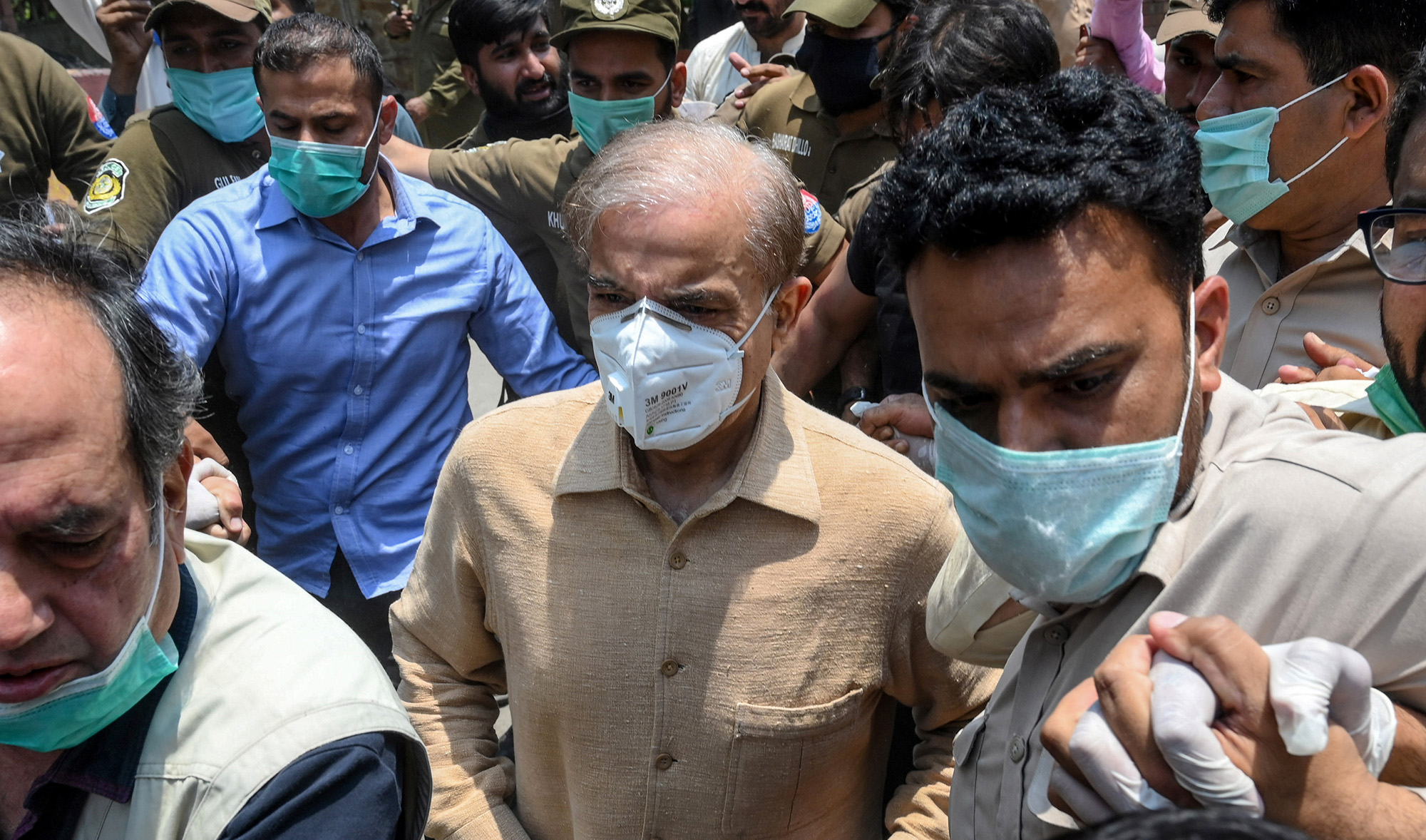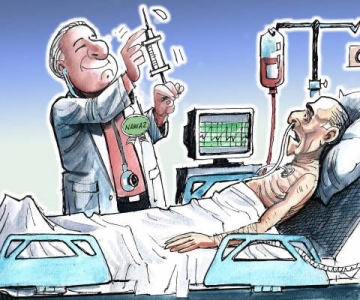October 7, 2018: When democracy turns into a farce
The arrest of Leader of the Opposition and former Chief Minister Punjab Shehbaz Sharif is a reminder of creeping authoritarianism and arbitrary governance that are turning into the new normal. Not that politicians should not be held accountable or punished, the timing of this action –days before by-elections in Lahore – raises questions and makes one wonder if its once again coming from the controlled democracy playbook. It was hoped that with a new government in office things would improve but the decline in democratic norms has been sharper than before.
Three types of controlled democracy experiments have been conducted in our history. First, when a top bureaucrat would rise to the office of Governor General or Prime minister (1950s). Second, a weak civilian government controlled by a powerful President acting as the face of civil-military bureaucracy (1990s). Third, where a military chief would lord over an obedient civilian government (1980s, 2000s) and change prime ministers at will. A common thread in all these versions of democracy was the acquiescence of the judiciary from upholding dismissals of parliaments, prime ministers and selection of those who could be elected. Another common feature of such democraticexperimentation was a controlled media and civil liberties.
All three models are history now. Since 2008, we have witnessed the emergence of a hybrid democracy where the unelected institutions do not exercise direct control but have chosen their turfs to protect and exercise control through other means. The judicial appointments process approved by the Parliament under 18thamendment was resisted by the judiciary. And the civilian governments know the limits of their powers in security and foreign policies. Since the tenure of Gen Raheel Sharif and the launch of operations against militants, the role of the military has also grown in internal security matters. The apex committees, seemingly instruments of coordination, showed everyone who was in charge.
The PFUJ has also highlighted the brewing crisis in media industry: “The media owners have taken over editors in their newsrooms, and thus the role of editor — which had played an important role (in preserving) the freedom of expression — has been eliminated…”
Since the restoration of judges under the PPP government, it was thought that independent courts would safeguard citizen rights and also protect democracy. There have been high-sounding declarations from judges that they would protect democracy at all costs and resist martial law. Yet, the courts seem to be the primary instrument of political cleansing. One cannot argue that there is a larger plan at work but the manner in which a sitting prime minister – Nawaz Sharif -was ousted (based on something that the petition never asked for) and how he was jailed a year later on a judgment that has been assailed by a higher court, it appears that the courts are dispensing due process, which is a fundamental right of every citizen including those deigned and defamed as ‘corrupt’ or ‘treasonous.’ The real worry is that this is happening not under a martial law but a ‘democracy’ of sorts.
The use of accountability regime – national accountability bureau, the federal investigation agency, the special courts and assorted joint investigation teams with intelligence officials – is a handy instrument for keeping the ‘old’ guard’ out in favour of the ‘new’.
We have a free and noisy media that knows its limits. Dozens of talk shows appear to enjoy the freedom and there are no censorship directives. Yet, the executive council of Pakistan Federal Union of Journalists (PFUJ) at the end of last month stated: “The state institutions are trying to control the media through curtailing their advertisements, hampering the distribution of newspapers and taking off-air those television channels who do not toe their line…” The PFUJ has also highlighted the brewing crisis in media industry: “The media owners have taken over editors in their newsrooms, and thus the role of editor — which had played an important role [in preserving] the freedom of expression — has been eliminated…Most journalists and media houses have started self-censoring to avoid the wrath of the state institutions.”
In a most bizarre and worrying development DAWN’s Cyril Almeida may face a trial for treason for simply interviewing the former PM wherein the latter mentioned the role of Pakistan in 2008 Mumbai terror attacks, something that has been said before by many others. Senior journalists such as Najam Sethi and former head of electronic media regulator Absar Alam are also facing cases for conducting and allowing ‘anti-state’ programming. All of this is made worse by the fact that media professionals are divided. And many journalists claim that these claims are exaggerated. If anything the media is free. In short the corporatisation of Pakistani media has destroyed the function of editors as more and more businessmen are operating media outlets primarily for their own narrow financial and institutional interests.
Clampdown on civil society and free expression has other guises as well. At least 18 international NGOs are being sent packing. True that NGOs such as Save the Children were involved in spying but is that true for all others? What about thousands who are employed with these organisations and all the support they provide to some useful community based initiatives? The truth is that if the state was that responsive and effective Pakistan wouldn’t need aid or support by outsiders. Ironically, this move comes at a time when Pakistan’s government is all set to approach the International Monetary Fund for a bailout worth billions of dollars and the foreign minister has asked the United States to resume aid.
A young man, Hayat Khan Preghal was arrested and prosecuted for his online posts that were critical of state institutions. Preghal was a supporter of Pashtun Tahafuz Movement and had been active online. One need not agree with what Preghal or PTM say but in a democratic society all voices should find space and political engagement is always a preferable option to dissenters choosing violence. This simple lesson from our own history seems to have been ignored by those who wield power. Amnesty International before Preghal’s release had asked for “an end to the harassment, stigmatization, intimidation, unlawful surveillance and arrest of human rights defenders and ensure they can freely express their opinions and dissent without fear of reprisals.”
In the first few weeks of the current government, an Economics Professor at Princeton was asked to resign from an advisory council mainly due to the outcry against his Ahmadi faith by the right wing and the opposition. The minister for Human Rights chided Human Rights Watch for its hypocrisy and claimed that minorities enjoyed protection and equal status in the country. That such a claim was made after firing someone for his faith was an irony altogether lost on the minister and her colleagues.
More recently, the supposedly reformed police in Khyber-Pukhtunkhwa unleashed a crackdown on students at the University of Peshawar. Their crime was to exercise a constitutionally-enshrined democratic right against a hike in tuition fees. It’s about time the state stops infantilizing students and crushing their civil liberties.
Pakistan has a third elected government now but that is not enough for a democracy to function. The powerful institutions of the state and corporate media have joined hands to turn the country into a controlled democracy where curtailed press freedoms, selective civil liberties, political victimisation in the name of accountability and manipulated electoral process are being projected as acceptable.
The new government led by Imran Khan should remember that things change fast in Pakistan. By enabling such an authoritarian environment, they might be harming their own cause. For the state of being ‘in favour’ usually is transient and uninsured. Ultimately a free press, an independent judiciary and neutral accountability processes are non-negotiable for a well-governed polity.



